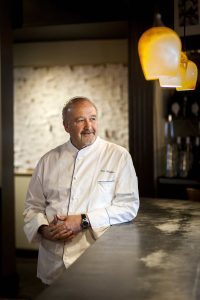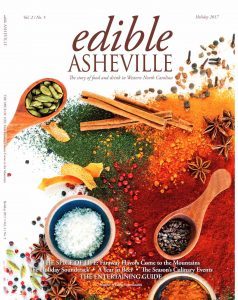It’s All In The Sauce
Asheville’s pasta maestros serve up something for everyone
By C.A. Carlson | Photos by Erin Adams
Italian director Federico Fellini once said, “Life is a combination of magic and pasta.” And sometimes life—from cultural heritage to family history to personal expression—is captured in the combination of a magical sauce with the right pasta.
Whether your taste tends toward the classic or creative, these three local restaurant owners offer options for every palate.
TRADITION
Eric Scheffer knows that your nana’s Sunday gravy was the best. Whatever mix of meat, time, and love went into her version of the classic sauce, it’s the flavor of your Italian American childhood, the touchstone for your memories of family and food.
If you weren’t born Italian American, though, or if you’re longing for a taste of the past without the hours of work, he invites you to try his Aunt Stella’s Sunday gravy, a fixture on the menu of Vinnie’s Neighborhood Italian since Scheffer opened the North Asheville restaurant in 2010.
“Sunday gravy is part of my effort to recapture a time that’s lost, when families came together every week to share stories and laughter and joy over a great meal,” says Scheffer, a pioneer of the Asheville food scene who offered some of the area’s first contemporary fine dining at Savoy. He closed that restaurant after the economic crisis of 2008 and 2009 to open Vinnie’s, in response to both customer demand for comfort food and his own desire to get back to his roots.
Growing up in a Jewish household on Long Island, he spent hours hanging out in the kitchens of his Italian American friends, and his Aunt Stella married into a family who taught her the tradition of Sunday gravy.
“Some people just call it ‘sauce,’ but if you’re from the Northeast, you probably know it as ‘gravy,’” says Scheffer. It may have its roots in the Italian braises known as ragùs, including the classic bolognese, but the abundance and variety of meat in Sunday gravy reflect the growing prosperity of Italian immigrants who came to the United States in the 19th and 20th centuries.
Most versions, including Vinnie’s, offer meatballs and sausage. Scheffer adds veal, too, and other recipes incorporate braciole (beef rolled around a filling of Parmesan and breadcrumbs), short ribs, and even pork chops.
The families Scheffer knew would start making Sunday gravy when they got home from church. It’s a long process, even in a restaurant kitchen: Over two hours, an “Italian roux” is built with oil, garlic, tomato paste, and herbs. Tomatoes and the Vinnie’s “mother sauce” are added, and then meat that has been browning separately is layered into the pot. Several more hours later, it’s ready to be dished up with Vinnie’s spaghetti, though Scheffer remembers it fondly as part of his Aunt Stella’s “riggies,” or rigatoni.
“I was always coming into the kitchen and dipping some bread into the sauce as it cooked,” he recalls. “And somebody was constantly stirring, putting their love into holding that wooden spoon. I want to give people that on the plate—something that is nourishing and soulful, that comes from my heart to somebody else’s heart.”
INVENTION
Unless your nana was clipping recipes in the 1980s, you probably didn’t have vodka sauce at her table. The exact origins of the tomato-cream-and-booze concoction are hotly debated in online food forums: conspiracy theorists suggest that the recipe was created by vodka distillers to push their product, while Seton Hall University law professor Paula Franzese has said publicly that her chef father created the dish in a New York restaurant kitchen.
No matter how it came to be, vodka sauce probably dates back no more than forty years, but it’s quickly become a standard, and it’s a favorite of Anthony Cerrato, executive chef and owner of Strada Italiano in downtown Asheville.
“I grew up in Nutley, New Jersey, and every restaurant up there has vodka sauce,” says Cerrato, who has been marrying Italian and Italian American traditions with local, sustainable sourcing on the Strada menu since 2012. “It’s a very versatile sauce, and it’s really simple. That’s the great thing about Italian cooking—it’s simple, and it’s all about the ingredients.”
Cerrato takes pride in the Hickory Nut Gap meat and Ivy Creek Family Farm produce he offers at Strada, and he uses an extra-rich, 40-percent-fat cream from Mills River Creamery in his take on vodka sauce.
He begins by sautéing olive oil, shallots, and butter, with fresh basil and a touch of crushed red pepper, and he deglazes the pan with vodka, allowing it to flame up. “I try not to cook out all the alcohol at that stage,” says Cerrato. “You still want the vodka flavor at the end, because it gives a different depth to the sauce.”
Cerrato then adds Strada’s housemade marinara and the Mills River cream. “The richer the cream, the less you need to use,” he says. Then he lets the sauce simmer. The dish is finished with finegrated Pecorino Romano and Italian parsley. The result is both rich and light, with the almost indefinable, peppery kick of the alcohol still detectable.
“Everything is better with vodka,” laughs Cerrato.
While the sauce is most commonly seen with penne, he combines it with fresh, barely wilted spinach (“for the earthy flavor”) and tricolor tortellini. If customers request it with another pasta, though, like bucatini or linguine, he’s happy to oblige.
“My kitchen doesn’t say no,” says Cerrato. “We have gluten-free options, too, like our gnocchi and some of our pastas. That’s the hospitality industry, but that’s also Italian culture, doing your best to take care of people.”
REINVENTION
If the phrase “Caribbean pasta” makes you do a culinary double-take, you’re not alone. Pasta is not a tradition in the islands, and Aaron Lee Thomas, the head chef and owner of Asheville’s two Nine Mile locations, will be the first to tell you that he doesn’t serve the same cuisine you might find on the beach at Montego Bay, although the restaurants come up in searches for Jamaican cuisine.
“We started out as Caribbean fusion, and now we’re really world fusion,” says Thomas. “Jerks, curries, Cajun spices—I like bold flavors, and pasta is like a blank canvas, a clean slate, where you can combine them.”
A lifelong reggae fan, Thomas discovered the food of Jamaica on a college spring break trip, and he still reminisces about his first jerk sauce, made from a recipe his mother found in a local newspaper. Over a cooking career that included a stint at a Colorado restaurant that served its own take on pasta with Caribbean flavors, Thomas developed a vision and a menu for a neighborhood joint that would bring together all the tastes he loved.
With help from the late Roland Knoll, owner of the Lucky Otter, he opened the first location of Nine Mile on Montford Avenue in 2008.
The Jamaican Me Thirsty has been offered since day one, and it’s still one of the best-selling dishes at both the Montford restaurant and the Haywood Road branch, which opened in 2014. It combines Knoll’s recipe for marinara sauce with Nine Mile’s housemade jerk sauce, whose gentle heat comes from jalapeños against a backdrop of allspice, nutmeg, ginger, and cinnamon.
Customers can ask the kitchen to kick up the spice several levels with a combination of jalapeño and habanero, and the made-to-order sauce is combined with freshly sautéed vegetables, jerk chicken or tofu, and linguine.
Like most of Nine Mile’s pasta dishes, customers can order it with rice or gluten-free pasta instead, and it comes with a side of natty bread (a play on the Rastafarian phrase “natty dreads”), a garlic-bread analog invented by Thomas and slathered with Cajun-spiced oil.
Other pasta offerings include the Raggy Road, which combines tilapia and a coconut-chipotle sauce, and the eponymous Nine Mile, whose ginger-tomato sauce “really tastes like ginger,” says Thomas.
“We’re trying to take our flavors to a whole new level. I don’t want to punch you in the face, but I want you to taste what’s in there,” says Thomas. “If your sauce isn’t good, your dish isn’t good.” ◊◊
C.A. Carlson grew up in the Midwest eating Chef Boyardee from a can. She now knows better, and she lives and writes in West Asheville. She is also the copy editor of this magazine.
Save
Save
Save
Save
Save
Save
Save
Save
Save
Save

Eric Scheffer, owner of Vinnie’s Neighborhood Italian.

Aaron Lee Thomas, owner and head chef of Nine Mile.
THE WEEKLY REVEL
Sign up for your free handpicked guide to enjoying life around Asheville.
Available weekly from May to October.





